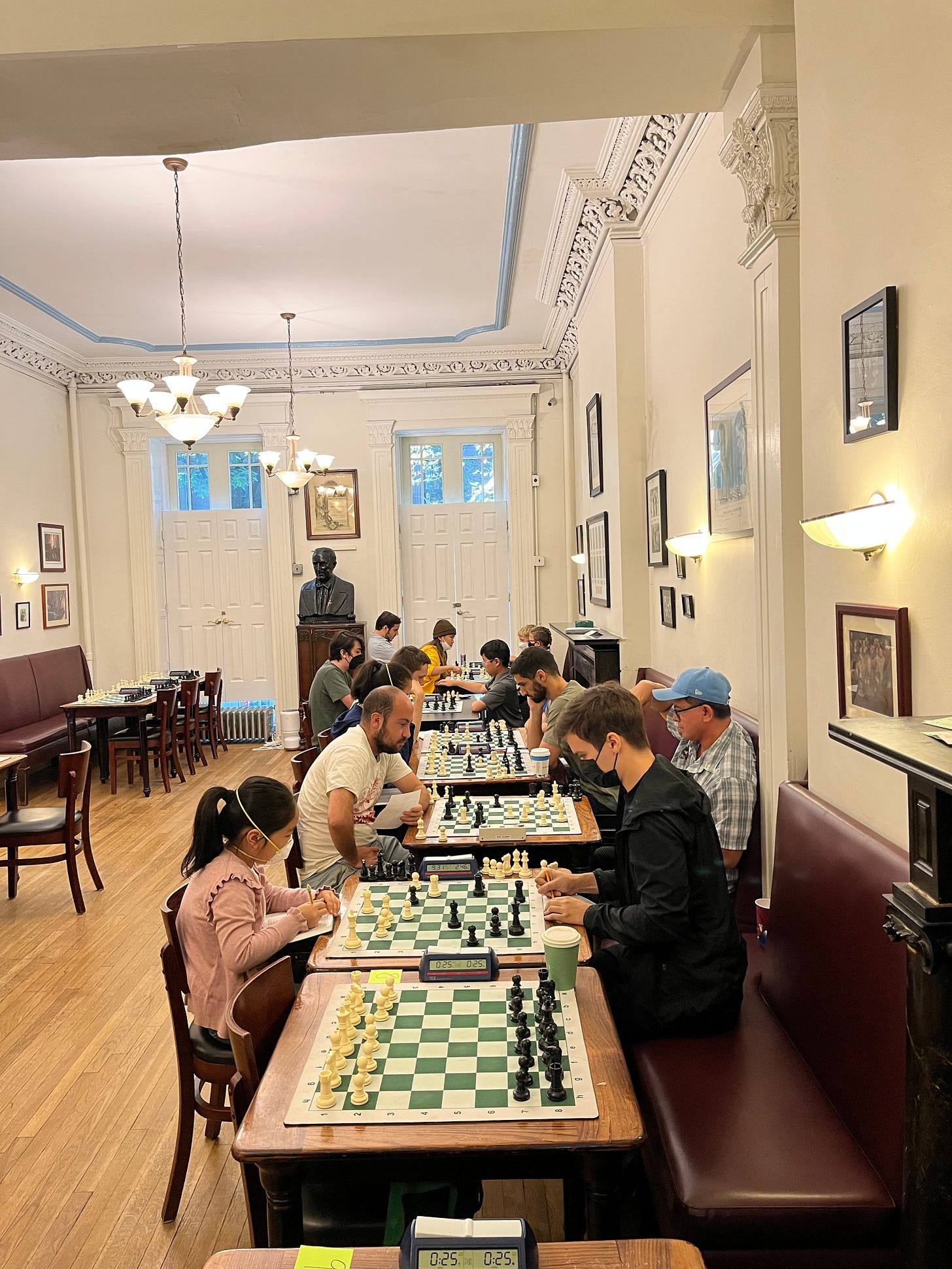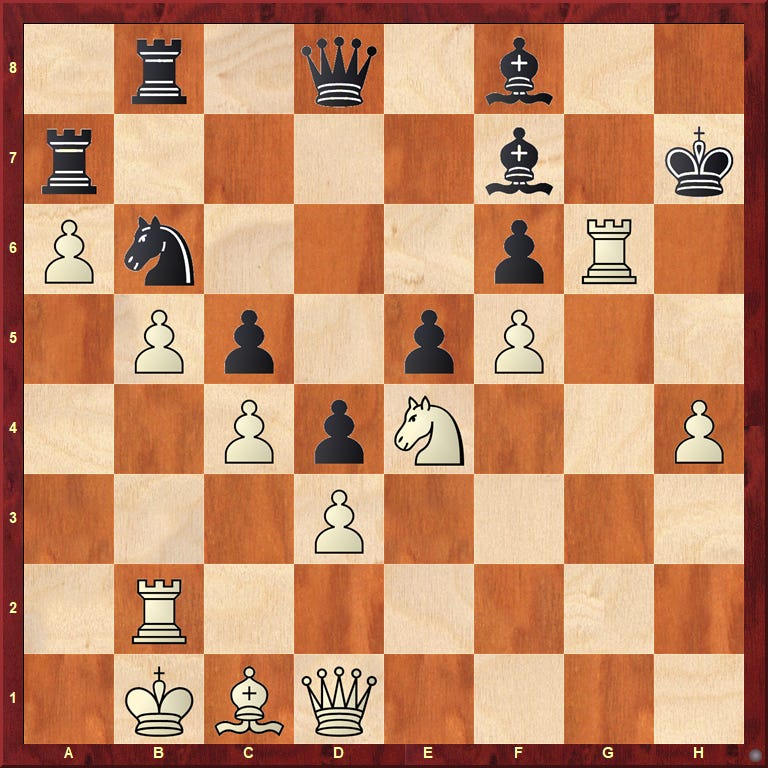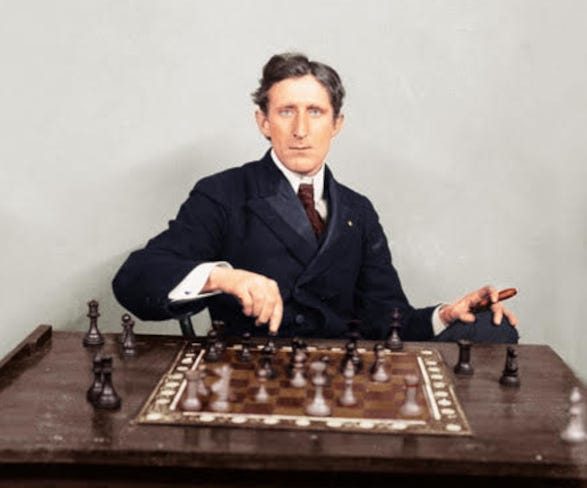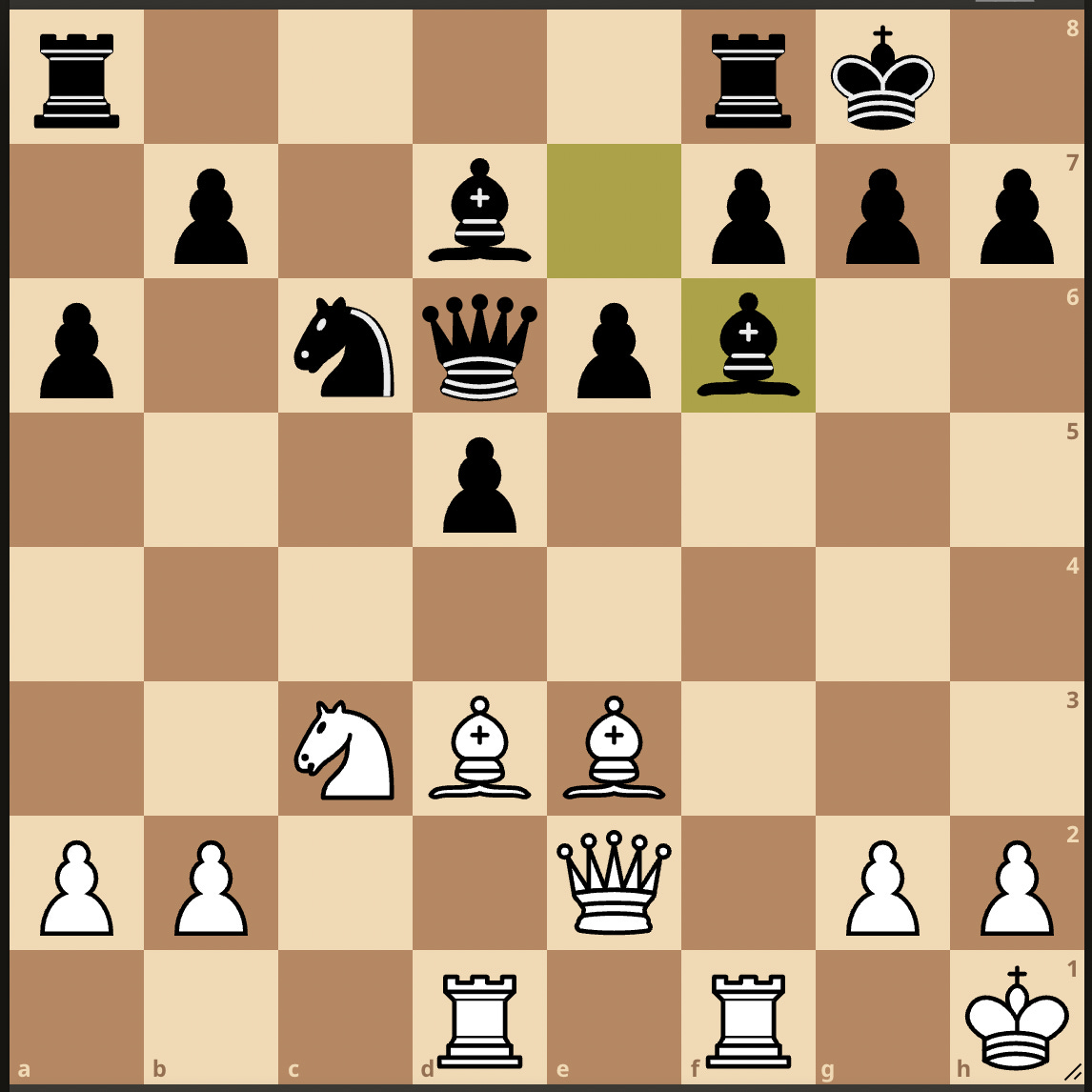The Marshall Spectator

In This Issue:
From The Skittles Room
King's Kibitzes, by FM Alex King
Best Game Contest
FM Alisa Melekhina Lecture & Book Signing, October 11th
Across the Table
Chess Toons
En Passant
Problem of the Week
Editor's Note

Welcome back dear readers to this edition of the Marshall Chess Club's fortnightly bulletin, The Marshall Spectator.
Have you seen our new Puzzle Rush Leaderboard for Marshall Chess Club Members? It's awesome! If you're feeling competitive and think you have what it takes to climb the ranks, simply register for the Puzzle Rush Leaderboard here and your stats will appear automatically.
Several weekly tournaments came to an end this week, so together with our usual busy calendar, we have a lot of events to report on. The Boris Privman Action tournament on Thursday September 8th had 23 players registered and a single clear winner: FM Aaron Jacobson took home $132 dollars for his efforts. 5 players tied with 3 out of 4 points. IM Yury Lapshun, IM Michael Song, Nura Baalla and Michael Li all earned $33 for their performance while Mr. Jose De Villa snagged the class prize of $66.
The Thursday Open concluded on Thursday September 8th, with George Berg winning first place scoring an impressive 5.5 out of 6 and winning the first place prize of $80, while Mark Gerstl and John Brendel tied for 2nd and 3rd and earned $44 each. Alice Chovanec also finished in the money with a 3.5 out of 6 performance and a $24 prize.
The Saturday Morning Under 2000 Action tournament had a three-way tie for first, with Sergey Nizhegorodtsev, Kathleen Meniano, and Matthew Chan each finishing with a perfect 3/3 score and earning $66 each for their efforts.
The September FIDE Premier had 39 players registered and saw IM Michael Song win clear first with 4.5/5 points and taking home $1,133.33 for his efforts. There were three players who scored 4/5, GM Mark Paragua, FM Aaron Jacobson, and FM Brewington Hardaway each earned $189.89. Kyle B Lancman and Daniel Johnston finished with 3.5/5 and earned $141.67 for their efforts.
The Under 2000 Section of the Premier had 31 players registered and a clear first winner. Rachel Miller finished with 4.5/5 and earned $370, while Morgan Mairaj and Linxi Zhu both scored 4/5 and earned $75 for their efforts. The class prizes were split among 6 players: Suvan Baranwal, James Ko, Sophie Zhu, Sophia Ng, Julian Spedalieri, Benjamin Davar all got $38.33 for their performance.
The Rated Beginner Open on September 11th had 26 players registered and a two-way tie for first. Dmitriy Guller and Eric Niyazov both finished with perfect 3/3 scores and earned $117 for their perfect result.
The Marshall Monday Under 1800 concluded on September 12th with 12 players registered and 1 clear first place finisher. Michael Bramford scored 5/6 and took home the prize of $125 for his efforts. Sophie Zhu and Chris Weldon both finished with 4/5 and earned $62.50, while Isabella Zhu and Anthony Zhu both earned $25 for their performance.
The Marshall FIDE Monday also concluded on September 12th. The event had 35 players registered and a clear first place finisher: Richard Herbst finished with 5/6 points and earned $420 for his efforts. Michael Glick and Daniel Frank Johnston both finished with 4.5/6 points and took home $210 for their efforts, while there was a 4-way tie with 4 points each among Robert Olsen, Kiren Nasta, George Berg, and Serge Adelson who each earned $52.
The Boris Privman Action tournament on September 15th had 27 chess players and once again saw IM Michael Song take home the clear first prize of $150 with a perfect 4/4 score. FM Aaron Jacobson and Oliver Chernin both finished with 3 out of 4 points and got $37.50 as a reward for their performance.
The Saturday Game 50 Under 1800 on September 17th had 15 players registered and a clear first winner: Leandro Nicholas Ulloa Centeno earned $78 for his perfect 4/4 score, while Ashton Bellur and Kiaan Javeri both scored 3 out of 4 points and earned $45 for their efforts.
The Saturday Game 50 Open had 36 players and was won by IM Justin Sarkar who scored a perfect 4 out of 4 points to take home the clear first prize of $216. Kiren Nasta and Jessica Hyatt both scored 3.5 out of 4 points to earn $72 each.
The Saturday Morning Under 2000 Action tournament on September 17th had 14 players registered. James Margolis scored a perfect 3 out of 3 and won the $56 first place prize in that event.
The Sunday Game 50 Under 1600 on September 18th had 23 players registered and was won by Nathan Bradley Favero. He earned $132 for the clear first place prize. There was a 4-way tie among Eric Liu, Sean Rong, Mr. Valery Zajkov and Owen Pang who all scored 3 out of 4 points and took home $38.50 each for their efforts.
The Sunday Game 50 Open had an incredible 50 players registered, but only one clear first place finisher. Aston Roberts scored a perfect 4 out of 4 points and took home the prize of $294 for his efforts. There was a three-way tie at the top among IM Justin Sarkar, Daniel Minkin, and Henry Burton who each scored 3.4 out of 4 points and earned $65.33 for their performance.
The Sunday Rated Beginner Open on September 18th had a remarkable 34 players registered and a 4-way tie among players who finished with a perfect 3 out of 3 score: Eric Niyazov, Nicholas Washington, Oskar Kostecki and Gabe Inwood won $76.50 each for their hard work.
To see these and all other recent results, click here.

There were several players who gained more than 100 rating points over the last couple weeks at the club.
Anjyu Fujita gained an astonishing 168 rating points in the Saturday Morning Under 2000 Action tournament. In that same event, James Margolis gained an eye-popping 165 rating points and Vicki Yan gained a remarkable 133 rating points. Owen J Pang gained an incredible 112 rating points in the Game 50 Under 1600 tournament. Max Lev Depaul saw his rating climb by an amazing 109 rating points in the Rated Beginner Open. Sharlene Yang saw a rating increase of 104 rating points after playing in the Game 50 Under 1600.
You can see who has gained the most rating points in our recent events by clicking here.
We are excited to announce a new class, Your Games Analyzed which is held on Thursdays at 8:30pm!
One of the most important components in improving your chess is the analysis of one's own games. Chess engines are helpful to an extent but oftentimes fall short in providing complete analysis and strategic understanding of a critical position.
Taught by National Masters Eric Balck and Devkaran Bhatty, the online format is ideal for the review of positions as the NMs help identify your strengths and weaknesses. (Recommended for players with a rating below 1200 USCF.) Upon registration, please send a pic of an interesting position from one of your games to ericb@marshallchessclub.org.
Pictured above, Marshall Chess Instructor Tamar Chanadiri
On Tuesdays, Chess Instructor Tamar Chanadiri teaches a chess class geared for adult beginner chess players from 6:30pm-8:00pm. In addition, Tamar Chanadiri's Saturday morning scholastic class will continue each Saturday morning in person at our club. Full details for both events can be found on our calendar.
On Tuesday, September 13th, GM Joel Benjamin and Harold Scott gave a lecture and book signing that was well attended. They recounted anecdotes from the history of the World Open Chess tournament, including the very topical issue of cheating. During the Q and A portion of the event, the recent Hans Niemann debacle was raised and led to a lively discussion. If you missed the event, you can still see it here.
On Friday, September 16th, the Marshall Chess Club hosted a very special event featuring film maker Tatia Skhirtladze and Chess Legend WGM Nana Alexandria, who was featured in the recent film Glory to the Queen.
To watch video of these events please check out our replay page.
Looking ahead to the month of October, we are excited to offer our members a book signing and lecture with FM Alisa Melekhina on Tuesday October 11th. Overcoming Self-Doubts and Setbacks in Chess: Lessons on and Off the Chess Board for Converting Advantages.
Join FM Alisa Melekhina for a lecture, book signing, and Q&A. Alisa will cover themes from her book on competitive gaming strategy, Reality Check: What the Ancient Game of Chess Can Teach You About Success in Modern Competitive Settings. The discussion will focus on overcoming self-doubts and obstacles, and Alisa will cover one of her chess games demonstrating the problem of converting advantages. Refreshments will be served.
— Greg Keener, Editor of the Spectator
King's Kibitzes
The Joy of Cheating
Seemingly the entire chess world has of late been abuzz with discussion, speculation, and outright fabulation regarding a story so sensational, so titillating, it has even managed to percolate into non-chess mainstream media.
I refer of course not to the Hans Niemann affair - rather a tempest in a teacup, that - but to my triumphant victory in my first correspondence chess tournament:

This 7-player round-robin, which began on August 5, is one of the “Aspirers” series of tournaments organized by the International Correspondence Chess Federation (ICCF). You may observe from the crosstable that although there are still three games ongoing in the tournament, none of the other players can overtake me in the final standings, and so I have secured first place. To quote the aforementioned Niemann:

Now, let me be upfront about one very important aspect of this tournament: I cheated.
Correspondence chess, a slow, asynchronous form of play in which the time control is on the scale of days per move, was first developed in an organized fashion in the 19th century in order to provide players a convenient flexibility of playing schedule, as well as the opportunity to really “play one’s best” unimpeded by ticking clock, sudden sneeze, and other sensory and psychological distractions of over-the-board play. Originally played via postal mail before transitioning in the internet age to email, correspondence is now more popular than ever thanks to its availability on major websites like Chess.com and Lichess.org. But as we are all grimly aware, this same advance of technology has also brought with it the problem of players cheating by using computer assistance while playing.
ICCF, the correspondence counterpart to FIDE as the main international organization governing “official” rated play, has a policy regarding computer assistance which is in stark contrast to the aforementioned major chess websites, as well as to all over-the-board play: players can use computer assistance as much as they want. That’s right, players can consult engines while they play, in addition to the books and opening databases which are more widely allowed in other correspondence arenas. This radical “legalization” solution to the problem of computer cheating makes ICCF correspondence play fundamentally different than normal chess - the game becomes more akin to analysis, and the battle between two opponents comes down to whose engine or computer hardware is stronger, or who can better guide the engine and interpret its output.
As engines and hardware continue to increase in strength, competent correspondence players are finding it harder and harder to win games against each other. Take the following top-tier tournament which recently concluded:

56 draws out of 56 games. Everyone ties for first place - and last place.
One might ask: how is this fun? And how is it that anyone ever manages to win a correspondence game these days? Well, I can’t speak for the best players in the world, but in my little class event, several of my opponents clearly hadn’t optimized their workflow. My best guess is that they were using a weaker engine than I was, and/or running their engine on weaker hardware like their cell phone or in their internet browser (as opposed to running it directly on their computer, as I was). I would like to think that I also demonstrated greater skill than my opponents at analyzing using engines, but I’m not sure how much difference this actually made.
In any case, my first game of the tournament to finish was absolutely spectacular, one of the most memorable games I’ve ever played:
Alex King - Aroldo Lattarulo
ICCF 2022
1.Nf3 d5 2.c4 d4 3.b4 c5 4.Bb2 Nf6 5.g3 a5 6.b5 Qc7 7.e3 e5 8.Bg2 Bd6 9.d3 O-O 10.a4 h6 11.Bc1 Be6 12.e4 Nbd7 13.Nh4 Rae8 14.Qe2 Qc8

Already an unusual opening, but here appears the first really exotic move:
15.Kd1!? Nb6 16.Nd2 g6 17.Kc2 Kg7 18.Re1 Be7 19.Nb3 Rd8 20.Kb1 Kh7 21.Qf1 Ne8 22.Nf3 Nd6 23.Nfd2 f6 24.Nxa5

White has picked up a free pawn, although he must now carefully maintain the stability of his queenside.
24…Qa8 25.Ndb3 Rf7 26.f4 Bf8 27.Re2 Re7 28.Rc2 Nd7 29.f5 gxf5 30.exf5 Bg8 31.Nxb7!

A positional piece sacrifice for a second pawn, after which White will have connected passers on the queenside - although of course they currently serve to shield his own king.
31…Nxb7 32.Qh1 Rb8 33.Nd2 Qa7 34.Bxb7 Rxb7 35.Qe4 Kh8 36.a5 Re8 37.g4 Ra8 38.h4 Qb8 39.g5

White stakes out ever more space across the whole board, while Black’s pieces languish in passivity.
39…Rba7 40.Rca2 Qd8 41.Nb3 Bf7 42.Rg2 Bh5 43.gxh6 Bf7 44.Raa2 Rb8 45.Rab2 Qc7 46.h7 Qb7 47.Qg4 Kxh7 48.a6 Qc8 49.Nd2 Qd8 50.Ne4 Nb6 51.Qd1 Bg7 52.Rg3 Bf8 53.Rg6!

A further sacrifice to open up lines on the kingside.
53…Bxg6 54.fxg6+ Kg8 55.Qf3 Bg7 56.h5 f5 57.Qxf5 Qd7 58.Rf2 Qxf5 59.Rxf5 Rf8 60.Rxf8+ Bxf8 61.h6

An incredible position - Black is up a rook, but White has three extra pawns, four [sic] of which are passed!
61…Be7 62.Bd2 Ra8 63.Ba5 Nd7 64.Kc2 and Black resigned.
I hesitate to say I could never play a game like this in a normal over-the-board format, but I certainly have never played one so far. However, it did inspire me to at least attempt this kind of slow, complicated, full-board press in a subsequent Lichess rapid game, which I won, albeit in rather messy style.
My second game of the tournament to finish was the exact opposite of the first - my opponent played just as solidly and accurately as I did, and neither of us were able to make any progress whatsoever:
Henry Lagergren - Alex King
ICCF 2022
1.d4 Nf6 2.Bg5 c5 3.d5 Ne4 4.Bf4 e6 5.dxe6 fxe6 6.c3 Be7 7.Nf3 O-O 8.e3 d5 9.Nbd2 Nxd2 10.Qxd2 c4 11.Be2 Nd7 12.O-O Nc5 13.Qd4 a5 14.Bg5 Bxg5 15.Nxg5 Qc7 16.f4 h6 17.Nf3 a4 18.Bd1 a3 19.b3 cxb3 20.axb3 Bd7 21.Ne5 Bb5 22.Rf2 Rfc8 23.Rfa2 Nd7 24.Nxd7 Bxd7 25.c4 dxc4 26.bxc4 Rd8 27.Qc3 e5 28.fxe5 Be6 29.Be2 b5 30.Rxa3 Rxa3 31.Qxa3 Bxc4 32.Qc1 Qc5 33.Qc3 Re8 34.Ra5 Rc8 35.Bg4 Re8 36.Be2 Qc6 37.h3 Qe6 38.Bxc4 bxc4 39.Qd4 Rc8 40.Rd5 Qg6 41.Kh2 c3 42.e6 Qf6 43.Rc5 Qxe6 44.Rxc3 Re8 45.Rc7 Qe5+ 46.Qxe5 Rxe5 47.Rc3 Kf7 48.g4 h5 49.Kg3 hxg4 50.Kf4 Rh5 51.hxg4

On move 32 my opponent had offered a draw, but I declined. Then on move 47, I offered a draw, which he declined. But with White’s last move the position has simplified to seven total pieces on the board, making it subject to tablebase reference, and indeed, per ICCF rules, immediate adjudication based on that tablebase reference. I submitted my draw claim to the ICCF server, and it was accepted after a short automated verification process. I’ll envy that handy escape next time I’m defending a material-down endgame over the board with my clock ticking!
My subsequent games in the tournament fell into the same two categories: another completely solid and accurate draw, and two other wins against opponents who seemed to be using a weaker engine or some kind of otherwise suboptimal setup.
My final game to conclude was shockingly anticlimactic: my opponent, who had been playing so slowly (the time control was 50 days for every 10 moves) that we had only completed 9 moves in the time that it took me to finish all of my aforementioned other games, abruptly abandoned the tournament by resigning all of his games with a terse (though not impolite) parting message:

Overall, I enjoyed this tournament, despite the mundane perfect draws, the surreal slow-motion pace, and the farcical disengagement of my final opponent. The first game against Lattarulo alone was worth the price of admission. (Speaking of which, the entry fee for this tournament was $5, and my prize for first place was a 20% discount on a purchase with the tournament sponsor, Hiarcs.)
Will I play another engine correspondence tournament? I haven’t decided yet. But even if this turns out to be my swan song, I found it very interesting, and it has given me a lot to think about regarding what is the essence of chess and what place it has in my life, and in the world. Of course, chess does not require me to understand or explain it - as we all know:

— FM Alex King, Former Marshall Chess Club Staff Member
Best Recent Game Contest
The Spectator is thrilled to continue a contest for our current members. If you have played a recent game at the Marshall Chess Club that you think may be appealing to a wider audience, please submit it with your annotations to td@mashallchessclub.org.
We will select the most interesting game based both on the quality of play and annotations and publish it here for our readership to enjoy.
Congratulations to Anjyu Fujita for submitting the best annotated, recently played game and winning a free tournament entry.
We look forward to reading your submissions and sharing your recent brilliancies with our readership.

Evan Chowdhury vs Anjyu Fujita
Marshall Saturday Under 2000 Action
(play through the game here.)
This game is the game that I would like to enter. I chose this game because of the attack and the enormous amount of tactics in this game. I would focus on the move 22 for the main point. Move 22 was the main point in this game why White lost. He was losing before that but I believe that letting my knight and queen closer to the king was an unclear decision made by White. This game was very tactical for me but I enjoyed it very much. Thank you!
1.e4 c5 2. Nf3 d6 3. d4 cxd4 4. Nxd4 Nf6 5. Nc3 a6 6. Qd3 e6 7. a4 Nbd7 8. Qg3 Ne5?! 9. Be2 Ng6 10. O-O Be7 11. a5 O-O 12. Bd2 h6 13. Na4?? Nxe4 14. Qd3 d5 15. Nb6 Ne5 16. Qe3 Rb8 17. Be1 Bc5 18. c3 Ng6 19. Nxc8 Qxc8 20. b4 Ba7 21. Qc1?
This move is a mistake. f3 was best.
21…e5 22. Nf3? This move was another mistake. Nc2 was best. I believe this move was the main point why White lost - because of Nf4 and Qg4!
22… Nf4 23. Qb2 Qg4 24. g3? Checkmate is now unavoidable. Nh4 was best.
24...Nxg3 25. Nh4 Ngxe2+ 26. Kh1 Qxh4 27. Rg1 Nxg1 28. Kxg1 Qg4+ 29. Kf1 Qg2# Black wins by checkmate.
— Anjyu Fujita, Marshall Chess Club Member

Across the Table: Gary Patella
Q: When did you start playing chess and how did you learn?
I learned how the pieces moved at age 14.
At age 18, I started playing with friends and figuring things out just from playing.
At age 20 I saw people playing chess in the park, and I decided to play a game. While I was playing, Ralph Bucciano, someone I knew from the neighborhood, came over and watched the game. In the end I lost, but Ralph told me that I played extremely well, because my opponent, Todd Seidman, was expert strength.
Ralph told me to take a walk with him. We went back to his apartment where he grabbed a box, went over to his bookshelf, and started filling it with chess books. He told me he didn't need those books anymore, so he was giving them all to me. He must've given me about thirty books.
From those books, I learned chess notation, started learning actual openings, and improved my play.
At age 21 I was asked by Sam Pam to play on his team at the US Amateur Team East tournament That was my first chess tournament where I got my first provisional rating of 1550.

This picture was taken at Giraffe Manor in Kenya. I was there last year.
Q: How long have you been a member of the club?
I have been coming to the Marshall Chess Club for so long, I honestly don't remember when I first joined. On occasion I would let my membership lapse if I needed a break from chess, but that would only last about two months before I would come back and rejoin.
The longest I've ever gone without being a member occurred this year, when my membership expired in March and I did not rejoin until August. I was waiting until the club went back to a pre-pandemic schedule.
Q: What's your favorite opening trap?
One of my favorite openings is the Jaenisch Gambit (aka the Schliemann) against the Ruy Lopez. One trap in that line that I really like is 1. e4 e5 2. Nf3 Nc6 3. Bb5 f5 4. exf5 e4 5. Bxc6 dxc6 6. Ne5 Bxf5 7. Qh5+ g6 8. Nxg6 Bxg6 9. Qe5+ Qe7 10. Qxh8 Nf6

Where Black will castle queenside next and the white queen is lost.
Q: Any great game you've played at the Marshall you'd like to share?
One of the best games I played at the Marshall was at the Bobby Fischer 70th Birthday Blitz tournament, which took place on March 26, 2013. In the first round, I was paired with Jonas Wyss who was rated over 2300.
Gary Patella vs Jonas Wyss
Bobby Fischer 70th Birthday Blitz tournament
(Play through the game here.)
I was White and the game went as follows:
1. e4 e6 2. d4 d5 3. e5 c5 4. c3 Nc6 5. Nf3 Qb6 6. Bd3 cxd4 7. cxd4 Bd7 8. Nc3 Nxd4 9. Nxd4 Qxd4 10. 0-0 a6 11. Qe2 Ne7 12. Kh1 Nc6 13. Be3 Qxe5 14. f4 Qd6 15. f5 Be7 16. Rad1 0-0 17. f6 Bxf6

18. Rxf6! gxf6 19. Bxh7+ Kxh7 20. Qh5+ Kg8 21. Ne4 Qe7 22. Qg4+ Kh7 23. Qh4+ Kg7 24. Bh6+ Kg6 25. Qg4+ Kxh6 26. Rd3 and black resigned.
Although I must admit that most of the attack was something I had already seen from analyzing my on-line games.
Q: What about yourself would you like other members to know, that we may not know! Any surprising facts?
At age 31, someone that works with a lot of people on the autism spectrum told me that I might have Asperger's. I went to a facility to get tested in person, and I found out that I did, in fact, have Asperger's (now covered under the umbrella of high-functioning autism ever since DSM V was released). When I told my friends, most of them either said they already knew that or that it makes sense. The only friends that seemed surprised were the ones that play chess. This makes me think that there's probably a lot of undiagnosed chess players on the spectrum.
— Gary Patella, Marshall Chess Club Member
Chess Toons

En Passant
– The Perpetual Chess Podcast is back with another bonus pod to discuss the Sinquefield Cup controversy with Tuesday’s guest, GM Jacob Aagaard. Jacob has worked with Hans personally, and like the rest of the chess world has been following this story very closely.
– The Julius Baer Generation Cup takes place on chess24 18th to 25th September 2022. The event is part of the Meltwater Champions Chess Tour. The field has a deliberate mix of generations. Players include Magnus Carlsen, Jan-Krzysztof Duda, Quang Liem Le, R Praggnanandhaa, Levon Aronian, Arjun Erigaisi, Anish Giri, David Navara, Vincent Keymer, Radoslaw Wojtaszek, Vasyl Ivanchuk, Ivan Saric, Boris Gelfand, Hans Moke Niemann, Baskaran Adhiban andChristopher Woojin Yoo.
– The Chess.com Global Chess Championship commenced on Wednesday with the first batch of round of 64 matches. Former World Champion Vladimir Kramnik and GM Sam Sevian swept their matches with perfect 3-0 scores. GM Eric Hansen upset world number 21 Le Quang Liem in an armageddon playoff. You can watch the 2022 Chess.com Global Championship on Chess.com/TV.
Problem of the Week
T. R. Dawson, 1923

Mate in 3
Thomas Rayner Dawson was a giant in the field of chess problem composition. Tim Krabbé (in his Chess Curiosities, which we're continuing to mine for gems) notes that castling is the only move that has the property of vacating two squares at once. Of course, problemists have been all over this. But this particular problem by Dawson is just jaw-dropping. (Hint: Black has only two pawn moves, each of which opens a line.)
---
Last week's problem: Selesniev 1921

White to win
Solution to Selesniev 1921: 1.d7 Kc7 2.d8=Q+ Kxd8 3.O-O-O+ and wins. This castling move has to be timed perfectly! If 1.O-O-O?, then Ra2! and there's no win. If 2.O-O-O?, then Rb8! and again the win vanishes.
—Alexander George, Marshall Chess Club Member
Editor's Note
As always, if you have any feedback, comments, or would like to submit an article please contact me directly at gregk@marshallchessclub.org.
All of our new illustrations are done by NM Eric Balck. If you think they're as good as I do, send him a fan letter at ericb@marshallchessclub.org.
Enjoy, and thanks for reading!
The Marshall Chess Club
Address: 23 West Tenth Street New York, NY 10011
Contact: 212.477.3716; td@marshallchessclub.org
Hours: M-F 1pm-Midnight; Sat/Sun 9am-Midnight





